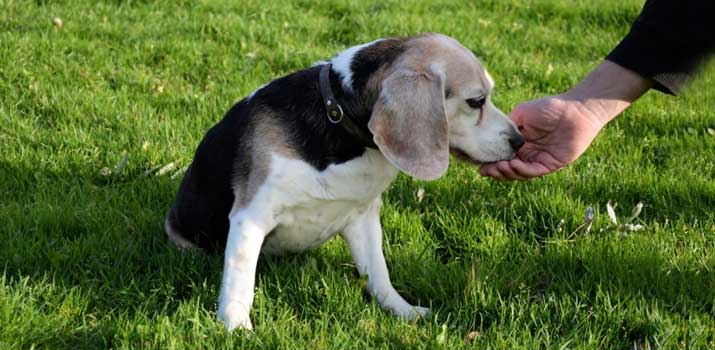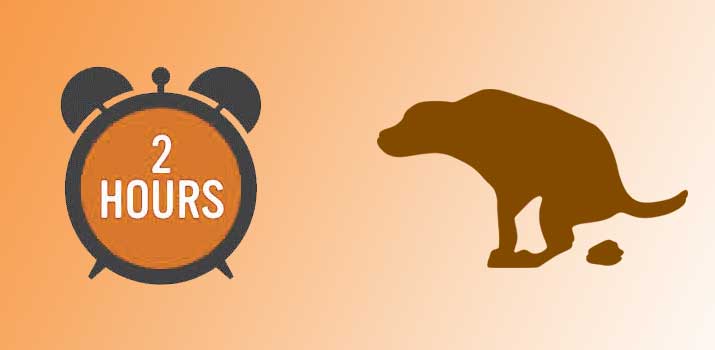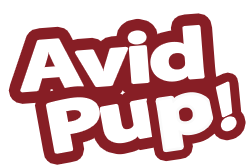
Learning about your dog’s pooping habits is an important part of being a dog owner. No one enjoys dealing with feces, but it’s one of the realities of raising these lovable creatures.
As adults, dogs typically have a regular schedule you can rely on. You learn to read the signs of when they need to do their business, making it much easier to plan walks and outings.
While mild illnesses can throw a wrench into the works, most dogs will get back on track once they start feeling better.Adult dogs can also hold things in when needed, giving you much more flexibility.
But what about puppies?
Puppies are a lot harder to read. Their bodies and digestive tracts are still developing, resulting in more urgency when the time comes. Plus, they’re learning the ropes of housebreaking!
Understanding your pup’s pooping habits is crucial. It changes over time as they age, but you might see puzzling behavior that has you scratching your head.
Case in point: Seeing that your puppy poops 2 hours after eating.
Many new dog owners worry about this seemingly quick urge. Doing their business only a couple of hours after eating seems far too quick, leading to growing concern among puppy parents.
But is this something you should worry about? Or is it completely normal?
How Long After a Puppy Eats Do They Poop?
We’ll cut to the chase. It’s perfectly normal for puppies to poop only two hours after eating. In fact, most need to go much sooner!
All canines are different, and several factors influence the digestive system. Everything from how much water your puppy drinks to how much exercise they get will affect pooping habits. The same goes for the quality of their food and overall health.
All that said, puppies usually have to relieve themselves several times throughout the day. How quickly they poop largely depends on when they last ate.
If they had a meal earlier in the day, it’s not uncommon for puppies to defecate a mere 30 minutes after eating a second meal. If they’re eating their first meal of the day, most puppies need to poop up to two hours later.
Of course, the exact timeline will vary. However, expecting poop within that two-hour window after eating is normal.
Some rambunctious pups may have to go outside immediately after eating. Meanwhile, others will need time to settle things before relieving themselves.
Either way, it’s a good idea to keep a watchful eye over your puppy the two hours after eating to avoid accidents.
Understanding the Digestive Process
To understand when a puppy will poop, we must look at its digestive system.
When raising a puppy, it is important to know that their bodies are still developing. The digestive tract isn’t as mature as an adult dog’s, and the muscles they need to control the urge to relieve themselves aren’t fully developed just yet. That comes with age.
Throughout the first year of your pup’s life, they’ll get better at holding things in until it’s appropriate to poop.
That’s why you must be patient with young dogs during the housetraining phase.
Sure, you’re also teaching your pup the “right” and “wrong” way to do their business. However, biological factors still prevent pups from “getting it” immediately.
Even if your puppy understands that they need to go outside to poop, it might not have the means to hold it. That’s why vets and trainers recommend taking puppies out at least every two hours.
The timing all comes down to the gastric-colic reflex. The gastric-colic reflex is a physiological reflex that controls the gastrointestinal tract’s operation.
Your puppy has no control over this process. When a dog eats, the food moves into the stomach. When the stomach fills, nerves trigger the gastric-colic reflex. The food can then move into the colon, where it’s broken down further.
That reflex is what’s responsible for creating the sudden urge to go. The same process happens in your body!
One common misconception about the pooping process for puppies is that food immediately moves through them. Despite how it looks, your puppy is not pooping out the food they just ate when they go outside after a meal. It’s the food they ate earlier.
What happens is that consuming another meal fills the stomach and triggers the gastric-colic reflex. The gastrointestinal tract is already doing its job, but eating can get things moving. The mess you clean up is the meal your pup ate earlier that day or the kibble they consumed the night before.
Related: Do Dogs Get Diarrhea When Teething?
Why Puppies Do Things Differently
You may be wondering why puppies need to go much sooner after eating than adult dogs. It all comes down to their developing bodies.
Your pup is a pint-sized ball of joy. Whether it’s a tiny Chihuahua or a large Mastiff, your puppy is still relatively small. Therefore, their stomachs are much smaller than an adult dog’s.
Not only that, but the gastrointestinal tract is shorter. As a result, puppies process food at a significantly faster pace.
Expect 30 minutes to two hours for your puppy to need to poop. That timeframe will gradually lengthen as your dog’s body develops. But as a rule of thumb, it’s important to let your dog out within 30 minutes after eating.
It’s also wise to pay attention to your pup’s behavior. Some dogs will need to poop sooner than 30 minutes, so you must be attentive and allow them to relieve themselves when necessary.
Do Puppies Poop After Every Meal?
The answer to this question varies. Some puppies will get the urge immediately after eating. Their stomachs fill, and their system starts moving, creating that sense of urgency. For other dogs, it’ll be a couple of hours later.
Too many factors affect this biological process to provide a definitive yes or no answer. As mentioned earlier, 30 minutes to two hours is the norm, but it all depends on the puppy.
Puppy Poops 2 Hours After Eating: Should You Be Concerned?

Seeing your puppy scratching at the door or having accidents in your home so soon after eating can be alarming. But don’t worry: It’s normal.
The truth is that puppies can have relatively unpredictable pooping habits. The “30 minutes to two hours” rule is not concrete. It’s a good rule of thumb, but puppies can still go for hours without relieving themselves.
In fact, it’s possible for them to go a full 24 hours without doing their business.
Larger puppy breeds will have an easier time holding things than smaller pups. Furthermore, the quality of food they eat, how much physical activity they do, and how much water they drink all factor into the digestive timeline.
The good news is that pooping two hours after eating is completely normal. That’s what you want to see because it indicates that your puppy’s system is working as it should.
When to Worry
There are a few potential red flags to worry about.
The first is if your dog doesn’t poop for more than 24 hours. When that happens, your little tyke could be dealing with the effects of constipation.
When constipation occurs, the digestive system backs up. It can be dangerous if not addressed, so it’s important to take your dog to a vet if they don’t relieve themselves for more than 24 hours.
Other signs of constipation include straining to defecate and loud noises beyond passing gas. Always watch your pup keenly to spot these signs of trouble.
Another possible problem is when your puppy poops way too much.
It’s common for dogs to defecate several times a day. But once it gets to five or six times, you should get help from a vet. Frequent pooping can point to many possible health problems, especially when paired with diarrhea or runny stool.
A vet can rule out any issues and recommend dietary changes to see improvements.
Getting Into the Swing of Puppy Pooping
If your puppy poops 2 hours after eating, don’t fret. It’s normal!
Learning how your dog does its business can be stressful. With so many changes occurring in your dog’s body, what’s normal now might not be normal tomorrow!
The key is to watch your pup closely and adapt to changes as they happen. Be vigilant in your training and continue providing a healthy diet.
Getting through the puppy years can be tough, but know that your furry friend will eventually fall into a schedule that makes your life much easier!
Also Read:

